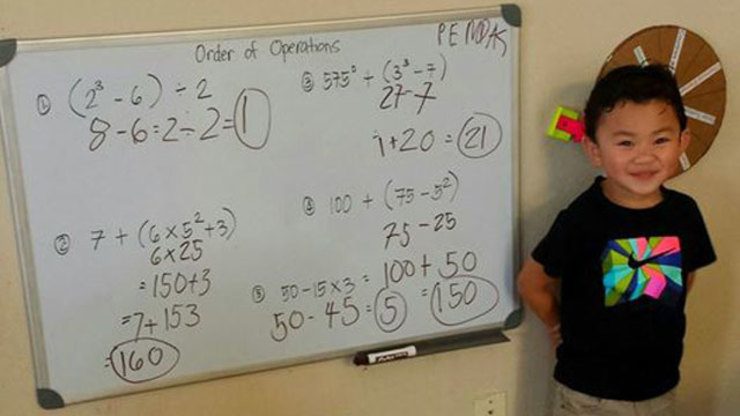SUMMARY
This is AI generated summarization, which may have errors. For context, always refer to the full article.

CEBU CITY, Philippines – In 3 minutes, Miko Secillano calculated the square roots of numbers 1 to 30. Before that, he solved the area of a rocket ship and a fish bowl. He has also memorized all the atomic numbers and symbols of 118 elements of the Periodic Table.
Miko is just 4 years old and he’s learning more than kids his age.
Miko’s dad Philip said he was tested for intelligence in mid-November and the result showed that he was “gifted”. His parents are sending his test result over to MENSA – an international organization of people with high IQ – to apply for membership. Members of MENSA have intelligence test scores above the 98th percentile.
A viral video of him solving the volume of a cube out loud as if he was teaching a class got more than 29,000 views in 3 weeks.
“I get a lot of messages from parents and professors all over the world,” Philip said. “A Mathematics professor in Brazil said he is ‘a prodigy, a fantastic promise.'”
Viral prodigy
Miko’s parents are from the Philippines but have lived in the United States for the past 8 years. His mom Imee is from Cebu and his dad Philip is from Albay. They currently live in Florida but come home to the Philippines every two years.
Philip takes videos of Miko solving Math problems in his whiteboard and uploads them on his Facebook page Miko and Mak. Philip is Miko’s pesonal tutor.
Although most of Miko’s videos were taken recently, his parents knew he was a fast learner since the age of 2.
“At the age of 2, Miko can count from 1 to 100,” Philip said.”But when we ask him to add 2 and 5, he could not answer yet.”
Miko learned to read by himself at this age. He was a huge fan of picture books.
At the age of 3, he was into maps. He can recite continents, countries and cities out of memory. A video of Miko shows his mom naming a country and Miko replying with its capital city. He was able to name 164 cities.
Miko discovered addition at the age of 4. He started stacking his toys in groups of 4 and 7 and started counting them.
“We were so excited when we saw him count,” Philip said.”His skill in Math began with grouping Play-doh containers.”
Since then, Philip and Miko spend 5 minutes every morning to learn a new Math concept.
“I see to it that he practices Math every day. Repetition helps retain knowledge,” Philip said. “Miko then shows his Mom what Math problem he solved that day.”
Advanced
When was asked if his teachers and friends know about his Math skills, he replied: “No. We only learn the alphabet. We don’t have Math in Pre-School!”
“Miko doesn’t brag (about) what he can do, (the) teacher doesn’t know yet,” said Philip. “The only thing the teacher notices is that Miko can read and do simple math like add. He always gets in trouble in school for not finishing his school work. That’s why this whole week we don’t have Math exercises because yun ang parusa nya for not finishing his school work. Magandang parusa no?” (That’s his punishment for not finishing his school work. Isn’t that a nice punishment?)
Miko believes it’s his favorite breakfast yogurt that makes him smart. Philip said it’s probably genetics: both mom and dad got good grades in high school Math.
Dr Flora Generalao, a Psychology professor from University of the Philippines Cebu, agrees with Philip. Miko’s ability in Math can be a product of heredity or genetic mutation.
“At the age of 4, the human brain is supposed to understand mostly concrete ideas,” Generalao said. “That is why most children learn better with pictures.”
Geometry problems are abstract ideas usually understood in the teenage years when the frontal lobe is more developed, Generalao added.
Playful
Aside from his amazing ability at Math, Miko is like any other fun-loving kid. When he’s not busy at his whiteboard, he’s into karate and swims with his friends.
Miko is also a rather precocious little boy who never fails to impress his proud parents. An exchange, as narrated by Philip on his Facebook page, shows just how endearing Miko can be at such a young age.
Nurturing the gifted
While it is important to nurture a gifted child’s skill, Dr Generalao said, the parents have to make sure that they develop the child’s socio-emotional skills too.
“The child should be exposed with friends and have some playtime,” Generalao added. “Playtime is when he learns how to empathize, follow rules, be competitive or admit defeat.”
In the genes?
Miko has a 7-month-old sister Mak whom he loves to play with.
Is Mak a genius too? Philip said he’s not sure yet. But when he’s teaching Miko new things, Mak appears to be ‘listening attentively’ nearby.
What does Miko want to be when he grows up?
“A pilot!” Miko answered excitedly.
“Geography is his first love,” Philip said. “He wants to fly around the world and visit different countries someday.”
While it’s no doubt Miko will go places in the future; he has already reached out and touched thousands of people around the world. – Rappler.com
Justine Raphael Luis Balane is a Mover from UP Cebu.
Add a comment
How does this make you feel?
There are no comments yet. Add your comment to start the conversation.